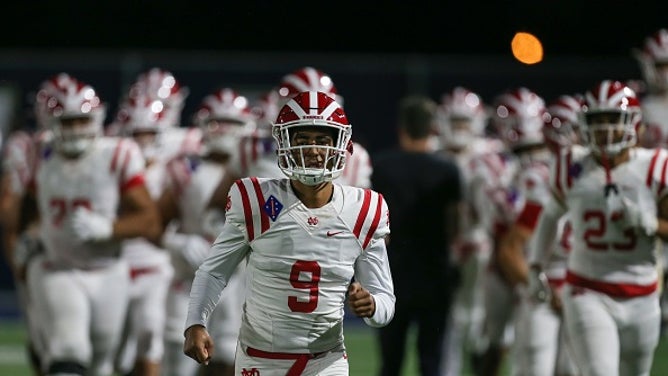NIL Laws Promise Gold Rush Fortunes, But At What Cost?
The NCAA’s departure from unpaid amateurism this month has been widely celebrated as a free-market liberation for young athletes who, in the public’s simple consciousness, generate millions in revenue but don’t get paid themselves.
A prominent Alabama football prep coach recently criticized new NIL laws in a radio spot. McGill-Toolen Catholic High School head coach Norman Joseph said he has no interest in returning to college coaching, where he spent four decades, because of the new laws.
“I have no interest. I think it’s the biggest cop out,” Joseph said on Mobile’s Sports Talk 99.5 FM.
Joseph has been of the few coaches to publicly reject the changes, which are widely accepted as necessary and long overdue by the media.
“Do you realize is making more money than some of the assistant coaches? So, here’s an assistant coach. He sits in a meeting with this guy. He says, ‘Hey, you got to get here on time.’ The guy could be like, ‘OK coach, sure, whatever you say. You know what I make. I know what you make. You are not going to tell me what to do.’
“Same thing if they say, ‘You got to start making your grades, you got to go to class, you know what our policies are.’ ‘Yeah, OK coach. I’ll be there tomorrow.’ How are you going to control those guys?”

(Photo by Jevone Moore/Icon Sportswire via Getty Images)
The near unanimous celebration of NIL (name, image, and likeness) laws being passed is indicative of many aspects of modern society in general. Like cavemen, we like to kill things with rocks.
We see perceived injustices, inefficiencies, or even just systems we deem antiquated (looking at you, conference expansion), and instead of thoughtfully tinkering with solutions over a period of time, we largely prefer dropping a boulder on its head and dancing around the carcass.
Once the kill is made, the army of PR reps and spin doctors comes out of the woodwork to tell everyone how to feel. Social media douses the issue in gasoline and then flicks a lit cigarette in its direction. As the history burns, public consciousness bickers to decide whether to nod in approval or shake in disapproval; and then, when the ashes have cooled, we simply move on to the next flammable topic, issue obliterated and nuanced be damned.
The absurdist system of ‘destruction first, planning second’ is what the left propagates every single day with their overwrought political-religious fervor, but we’re all guilty of it in unique ways. Our obsession with simple, ‘out of sight, out of mind’ solutions to extremely complex problems feels like efficiency, but the refusal to see one ripple past our own experience actually causes many more issues than it solves.
This theory of shortsightedness has been proven time and again to account for our world’s most serious economic woes, which always boil down to the same mistake: policies are made with a special interest group in mind, instead of the health of the entire organization.
Whether you’re in favor of NIL laws or opposed to them, the behemoth of potential issues that they create is staggering and worth a comprehensive deep-dive. But the consensus in media and with many fans alike, unsurprisingly, seems to point towards dry cleaning rather than carpentry.
Instead of measuring twice and cutting once, we’re just going to starch and iron the damn thing until it’s perfect…in an extra crispy kind of way. But will the shirt feel good to wear? Shouldn’t we at least understand why we’re nuking the shirt? Unfortunately, thoughtfulness and planning are becoming antiquated relics of the past—like the statues of Americans from another era being ripped down by leftists in a fit of momentary rage. Change it all now, and then figure it out later, we declare.
And suddenly, with that mindset, we’re very close to a world in which healthy skepticism either gets drowned out or labelled as some form of oppression or bigotry. How many coaches or administrators have you heard come out against NIL laws, or, at the very least, in favor of a little thoughtful planning? Besides Joseph, basically none. Why? Because to do so would be recruiting suicide. The players and their reps want the cash, bottom line, end of story. But it is in this exact moment that sound economic theory should at least be feigned: how will the changes affect all interested groups, and thus the delicate ecosystem of the entire sport itself.
I'm certainly not advocating for a return to amateurism, but rather a measured response to the exciting notion of change for the sake of change. As we already established, most people cannot fathom that a world exists beyond the first ripple of their own experience. Whatever you see is what you should care about, we often teach. The pursuit of the dollar has always washed away the sin of shortsightedness.
Curiously though, as we age and gain clarity, our reflections on life generally take less a tone of celebration of accomplishment, and more a lamentation on the ‘woulda, shoulda, coulda’ opportunities that passed us by before. Wish I knew then what I know now. Well, you could have known more then, if you had stopped to dive into the details, instead of furiously running to the next flammable heap.
To which the modern pragmatist responds, times are changing, and I don’t want to get left behind. And so it goes.